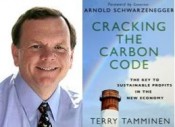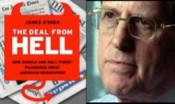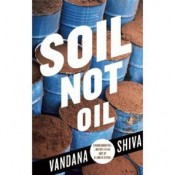Q&A: Terry Tamminen – Cracking the Carbon Code
Written on September 4th, 2012 |
Aired 09/02/12
When I first met TERRY TAMMINEN, he was living on a houseboat in the Marina and filling a position he’d founded as the first Santa Monica Baykeeper. No too long before that, he had been running a pool services company. And not too long after, he was Secretary of the California EPA.
Tamminen has reinvented himself successfully in several very different worlds — business, government, non-profit, foundation, from the grassroots to the halls of power. All of this for a long time now to achieve a sound and healthy relationship between society and the environment. He pursues that consistent vision with whatever works.
We’ll talk about the ideas in his book, CRACKING THE CARBON CODE: The Key to Sustainable Profits in the New Economy – which is very much a plan of action for companies who figure out that reducing carbon emissions reduces waste and is therefore good for the bottom line. He’ll tell stories of companies that have made or saved money by cutting carbon.
How has he been able to move things forward through politics and government in an era when so little seems to get done? Bottom line, are we moving fast enough? If not, how do we integrate all these different players to accelerate movement in the right direction?
http://seventhgenerationadvisors.org
Q&A: Peter Diamandis-Abundance Ahead
Written on March 28th, 2012 |
Aired 03/25/12
Recently the annual TED conference took place in Long Beach California. I have long recommended its famous 18 minute TED talks. Check out TED.com/talks, they cover a wide range of topics including science, technology, design, business, global issues and they have recurring themes of inspiration, challenge, and optimism. Not unlike what I try to do with this radio show.
On opening day the recent conference scheduled two talks one after the other. The first by Paul Gilding entitled The Earth is Full asked questions like Have we used up all our resources? Have we filled up all the livable space on Earth? Gilding suggests we have with the possibility of devastating consequences. In a talk that’s equal parts terrifying and oddly hopeful, he says “It takes a good crisis to get us going. When we feel fear and we fear loss we are capable of quite extraordinary things.”
That talk was followed by one by today’s guest, PETER DIAMANDIS, entitled Abundance Is Our Future in which he makes the case for optimism — that we’ll invent, innovate and create ways to solve the challenges that loom over us. “I’m not saying we don’t have our set of problems — problems – climate crisis, species extinction, water and energy shortage – we surely do. But ultimately, we knock them down.”
Since the dawn of humanity, a privileged few have lived in stark contrast to the majority. Conventional wisdom says this gap cannot be closed. But, according to a new book by Diamandis and co-author Steven Kotler, it is closing-fast. In Abundance: The Future is Better Than You Think, they document how progress in artificial intelligence, robotics, infinite computing, ubiquitous broadband networks, digital manufacturing, nanomaterials, synthetic biology, and many other exponentially growing technologies will enable us to make greater gains in the next two decades than we have in the previous two hundred years. They believe we will soon have the ability to meet and exceed the basic needs of every man, woman, and child on the planet.
http://www.abundancethebook.com
Q&A: JAMES O’SHEA, former editor-in-chief of the Los Angeles Times, author – THE DEAL FROM HELL
Written on November 23rd, 2011 |
11/20/11
This week’s show is about a Los Angeles institution and source of local pride, nurtured to greatness as a family-owned business, purchased by someone from out-of-town who knew little about the business, put up little of his own money, and ran the property into the ground so that it is now a shell of its former self. And many customers have reacted by not buying the product.
No, we’re not talking about the Dodgers, but the Los Angeles Times.
After buying Times Mirror, The Tribune Company sent JAMES O’SHEA to LA to run the Times. Sam Zell bought the Tribune Company in a deal that even I – no financial expert – thought was both bad and doomed, and soon the Tribune Company was in bankruptcy where it remains.
O’Shea refused to do his bosses’ bidding in terms of cutbacks and he was let go. Over the next two years the Times cut nearly 40% of its journalists. JAMES O’SHEA has since founded a Chicago news cooperative of which he is editor, attempting a new model of journalism.
JAMES O’SHEA is editor and co-founder of the Chicago News Cooperative, former editor-in-chief of the Los Angeles Times and past managing editor of the Chicago Tribune. Under his leadership, the Tribune’s news staff received six Pulitzer prizes. O’Shea is the author of THE DAISY CHAIN about the savings-and-loan crisis of the 1980s, DANGEROUS COMPANY, an examination of management consultants’ role in corporate decision making, and his latest THE DEAL FROM HELL: How Moguls and Wall Street Plundered Great American Newspapers.
http://www.chicagonewscoop.org/
Economic Armageddon: Gretchen Morgensen on How Wall Street Broke the Economy
Written on July 26th, 2011NYT business reporter Gretchen Morgensen discusses her new book and the corruption of the mortgage lending industry.
July 26, 2011 | Gretchen Morgensen was awarded the Pulitzer Prize in 2002 for her “trenchant and incisive” coverage of Wall Street and has been on that beat ever since. Her new book, Reckless Endangerment: How Outsized Ambition, Greed, and Corruption Led to Economic Armageddon (written with Joshua Rosner), lays out the toxic interplay between Washington, Wall Street and corrupt mortgage lenders that led to the meltdown. It examines how the watchdogs who were supposed to protect us from financial harm were actually complicit in creating the crisis.
Gretchen Morgenson is a business reporter and columnist at the New York Times, where she also serves as assistant business and financial editor. Prior to joining the Times in 1998, she worked as a broker at Dean Witter in the 1980s, and as a reporter at Forbes, Worth, and Money magazines.
Continue reading “Economic Armageddon: Gretchen Morgensen on How Wall Street Broke the Economy”
Q&A: VANDANA SHIVA, Physicist, Ecologist, Activist, Editor, & Author
Written on December 27th, 2010 |
Aired 12/26/10
Dr. Vandana Shiva is a physicist, ecologist, activist, editor, and author of many books. In India she has established Navdanya, a movement for biodiversity conservation and farmers` rights. She directs the Research Foundation for Science, Technology and Natural Resource Policy. Her books include Biopiracy: The Plunder of Nature and Knowledge, Stolen Harvest: The Hijacking of the Global Food Supply, and her newest, Soil Not Oil: Environmental Justice in an Age of Climate Crisis. Shiva has been awarded several awards for her efforts including the Right Livelihood Award and the United Nations Environment Program [UNEP] Global 500 Award in 1993, and most recently the 2010 City of Sydney Peace Prize.
